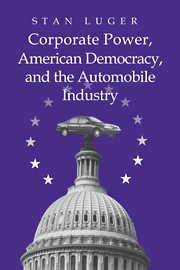Book contents
- Frontmatter
- Contents
- Acknowledgments
- Introduction
- 1 Studying Power in America
- 2 The Structure of the Auto Industry
- 3 Corporate Political Hegemony and Its Decline: 1916–1966
- 4 The Politics of Compromise: 1967–1978
- 5 The Resurgence of Corporate Power: 1979–1981
- 6 The Triumph of Corporate Power: Regulatory Policy, 1981–1988
- 7 The Triumph of Corporate Power: Trade Policy, 1981–1985
- 8 Interregnum: 1989–1996
- Conclusion: Corporate Power and American Democracy
- Index
1 - Studying Power in America
Published online by Cambridge University Press: 08 October 2009
- Frontmatter
- Contents
- Acknowledgments
- Introduction
- 1 Studying Power in America
- 2 The Structure of the Auto Industry
- 3 Corporate Political Hegemony and Its Decline: 1916–1966
- 4 The Politics of Compromise: 1967–1978
- 5 The Resurgence of Corporate Power: 1979–1981
- 6 The Triumph of Corporate Power: Regulatory Policy, 1981–1988
- 7 The Triumph of Corporate Power: Trade Policy, 1981–1985
- 8 Interregnum: 1989–1996
- Conclusion: Corporate Power and American Democracy
- Index
Summary
Political science is concerned with the study of social governance, or how societies are organized and how they change. A corollary to these issues is the question of power: Who in society shapes change, who benefits, and who does not. The classic encapsulation of this approach was made by Harold Lasswell, who wrote that politics is the study of who gets what, when, and how. Accordingly, the study of power is essential if political scientists are to respond to these issues, and such a study must include the economic power of business because of the central role it plays in the distribution of who gets what, when, and how. Unfortunately, most political scientists neglect these areas, in part because of the narrow focus on political behavior and the internal operation of government institutions that dominate research.
Among those political scientists who continue to study social organization and historical change, the concept of power remains contested. Debates have raged decade after decade, generating a voluminous literature, with little hope for any resolution. For years battle lines have been drawn over questions concerning what is actually meant by power, where power is located, how to study power, and how to evaluate the results of such inquiries. Sometimes the conclusions of a study tell us more about the perspective and assumptions of the researcher than about the material presented. Grappling with the issue of power is particularly complex in a liberal democracy where a political system based on formal equality is coupled with an economic system based on inequality of resources.
- Type
- Chapter
- Information
- Publisher: Cambridge University PressPrint publication year: 1999

